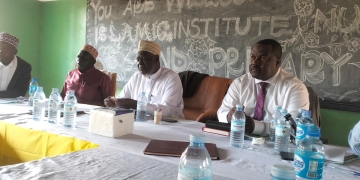
KAMPALA —The current plight of Afghans and Ukrainians is a timely reminder of how history repeats itself.
In 1972, Asians in Uganda were just months away from being told, by their president Idi Amin, that they had 90 days to leave the country.
This summer an exhibition at Greenham Common Control Tower in the United Kingdom remembers those refugees who arrived in the European nation 50 years ago.
There will be an official opening today (Saturday) at the Greenham Control Tower and Café at 10.30m.
At the time, Ugandan Asians from the Indian subcontinent owned 90 per cent of businesses in the country and were being accused of milking the Uganda economy
Four women have opened up about their experiences from fleeing their homes in Uganda, to volunteering at Greenham Common.
Leaving behind homes, friends and work around 80,000 people boarded planes with nothing but one suitcase and £50 in their pocketsLeaving behind homes, friends and work around 80,000 people boarded planes with nothing but one suitcase and £50 in their pockets
Child refugee
Headley resident and exhibition organiser Pragna Hay was only six-years-old when she was forced to flee her home with her parents and four siblings, aged between four and 12.
They left on October 13 and arrived at Stanstead airport the next day.
Pragna Hay arrived in Newbury at six-years-oldPragna Hay arrived in Newbury at six-years-old
Pragna, who is a former Greenham parish councillor, said: “The journey itself was difficult for a lot of people, with Ugandan soldiers being instructed to shoot anyone carrying more than they should.
“A lot of families found ways of getting things out, they stitched pockets under their saris.
“If they were stopped at a checkpoint and it was found, it was all taken from them.
“There were a lot of atrocities at the checkpoints.”
She described the moment a soldier shot somebody, but she couldn’t recall the reason
“My sister tells me stories of parents on coaches putting their young children’s heads down as to not scar them for the rest of their lives.”

Families were bundled on to coaches and taken to Houndstone Camp, Yeovil, where Pragna and her family stayed until February 14, 1973.
She was relocated to Greenham Common Camp on April 4 and then given a council house in Redditch.
The West Berkshire camp consisted of dormitories with “beds clustered together” for families to sleep on.
“The beds had grey blankets like you get in those movies of old military camps. People created sections to make their areas private using a piece of cloth or sari in between.
“They were possessive of their little area, you could not walk into someone else’s area without asking for permission first. And rightly so.”
Greenham Nurse
Among the staff was 78-year-old nurse Sarla Kakar.
Prior to becoming one of the camp nurses Sarla worked at the Battle Hospital in her hometown Reading.
The mother-of-two initially left work to have her second baby, but came across the opportunity to help the recent Ugandan arrivals and took it.
Sarla reflected on her time at the camp and said: “I enjoyed it, but now when I look back at it, it was a hard job and I was so young.
She said: “It was really heart-breaking. A lot of them were from well-to-do families, but they were coming here with nothing.
“It was so hurtful to see them, how they once were and how they had to leave everything behind.”
Making a new home
Author Bharti Dhir was only 11-years-old when she was expelled from Idi Amin’s rule.
The Asian-African mother of one, who now lives in Reading, will be reading an extract from her book Worth, which is about her journey as a refugee, at the Greenham Common Exhibition this summer.
Bharti, who adopted her now 17-year-old daughter when she was just six-months-old, said the story was written to “empower” her child as it details the love she’d felt from her own adoptive mother growing up.
As a baby, Bharti was abandoned at a roadside and found at two days old. She was taken in by a Pubjabi-Sikh family at around three to four weeks old.
By the time Idi Amin expelled all Asians from the country, Bharti’s adoptive mother Pritam Kaur had become a widow and journeyed through the checkpoints alone with her five children.
The journey was hard, there was only one driver to take 45 families out to the capital Kampala – a six to seven hour journey – and soldiers were ordered to shoot anyone taking a cent more than they should, out of the country.
Bharti, who was the only adopted child among her siblings, recalled the moment she feared her mother’s life at one of the checkpoints.
“We had just seen a disabled child being shot in front of us and then [the soldier] turned the gun towards my mum.”
Bharti was the only member of the family with dual heritage and she says “as far as the soldier was concerned [she] didn’t belong to [her mother]”.
“He ordered her to leave me behind, he ordered that several times and pointed the gun at her chest,” she explained.
“She refused.
“I still get emotional thinking about it. I was only 11-years-old.”
When she and her family moved from the camp to Reading they were met by racism.
“We had graffiti on our doors and on our walls. People were writing things like ‘Paki’s out’ and at one point it culminated in a fire,” she recalled.
“They cut a branch off a tree that was in our garden, put it across the front door and set fire to it.”
She added: “History is there to teach us that refugees will always be there.
“Refugees are not leaving because they’ve come for a better life in another country, it’s more about the fact that they have been forced to leave.”
Bharti will be joining other authors with similar stories for the exhibition and will be preparing a written piece as well as contributing photos to help tell the story.
Young volunteer
Red Cross volunteer Sally Breach was only 12 when she joined her family in helping the refugees, but had a slightly different experience.
Her role was to play with the children.
“They had no toys, we found a wheelbarrow and we were running children around in the wheelbarrow.
“It was great fun time as far as I was aware, the children were all really excited to be somewhere different.
“I remember meeting Sarla Kakar who was a nurse,” she said.
“She was the first lady I had ever seen wearing a sari and I was absolutely fascinated by it.
Sally recently joined a Ugandan Asians Facebook group came across a photo that she was in.
“A photo came up with my dad in it and then another with me and my brother [Simon]. I had seen it in the press before, but I commented saying I am in this.”
She has prepared information for Pragna ahead of the exhibition.
• The exhibition Uprooted at Greenham Control Tower began on July 1 and will run until the end of September.
• Bharti Dhir will be signing copies of her book Worth on October 21 at Whitewall Gallery, Parkway.









